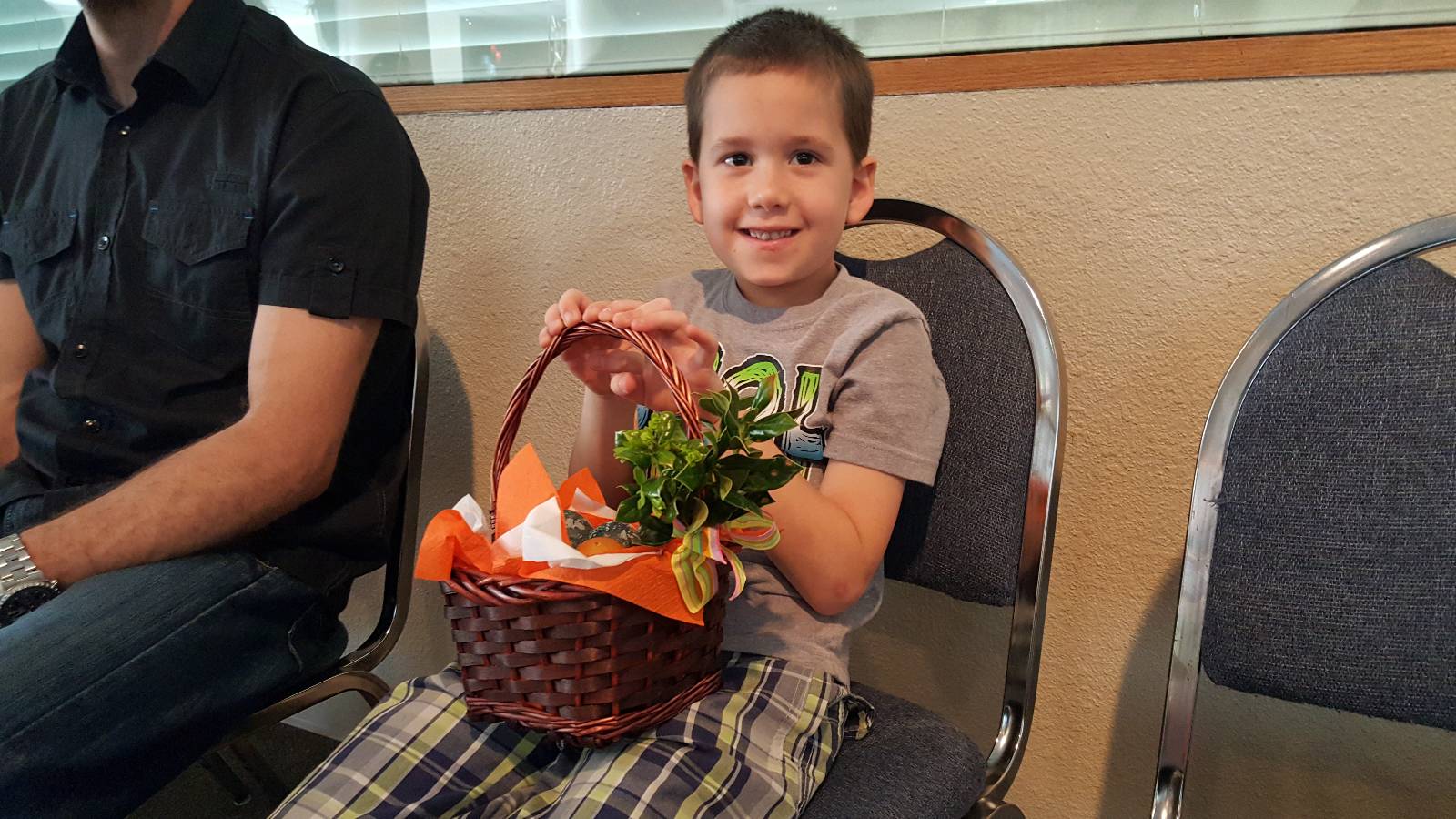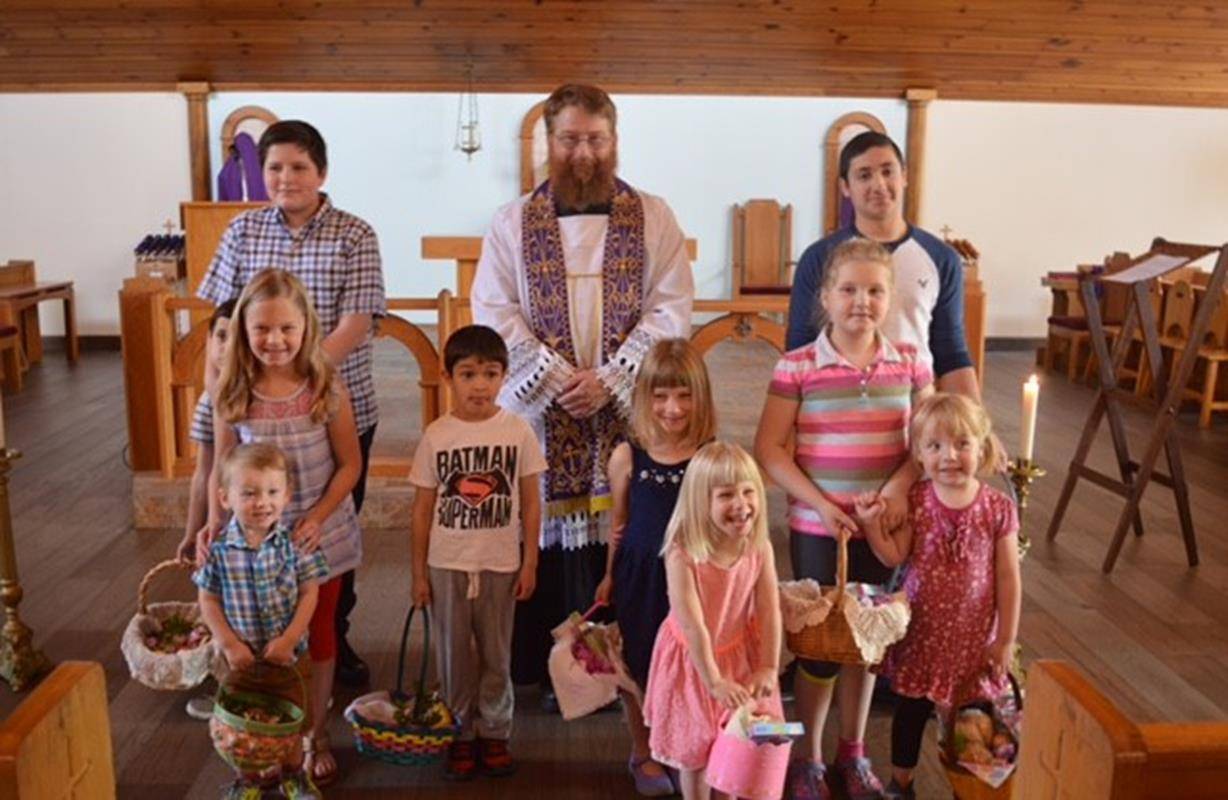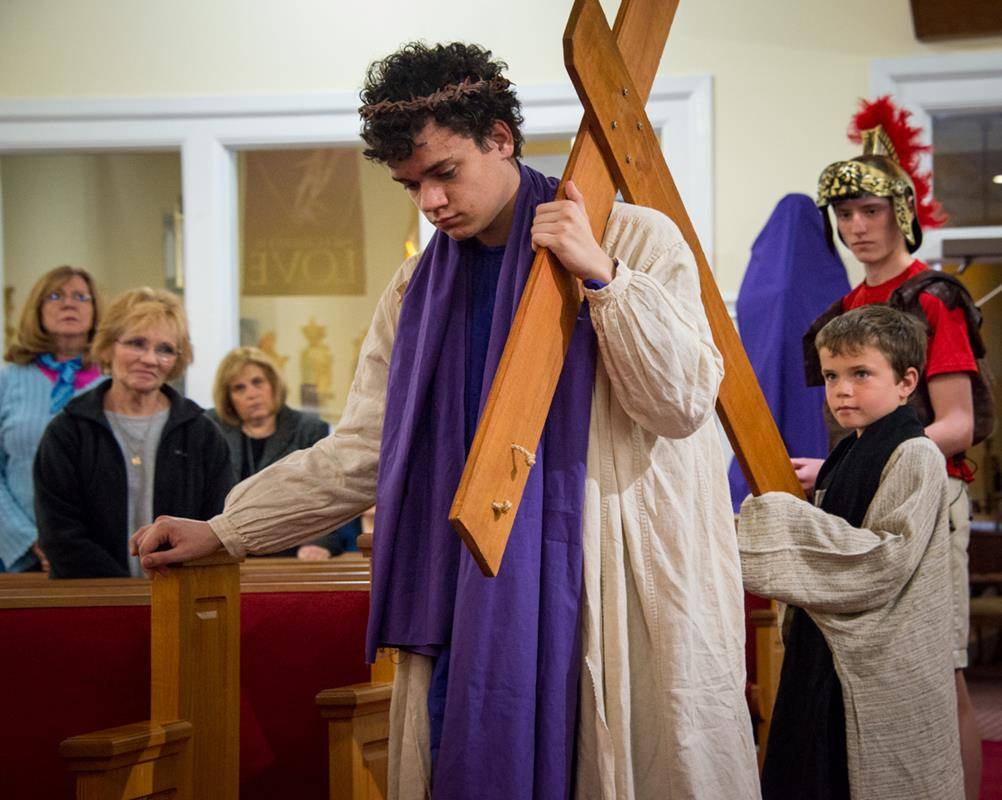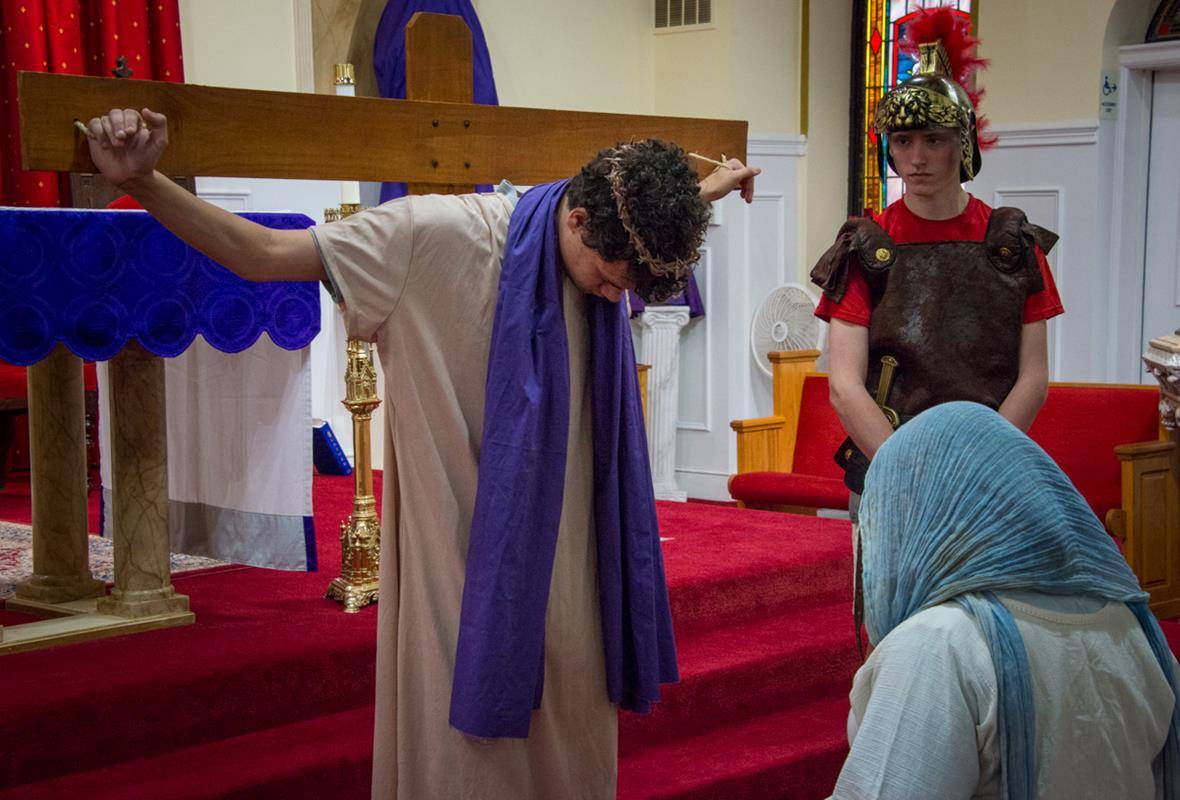 Hundreds of people across the Diocese of Charlotte are preparing to join the Catholic Church this Eastertime, through the diocese’s Rite of Christian Initiation (RCIA) program.
Hundreds of people across the Diocese of Charlotte are preparing to join the Catholic Church this Eastertime, through the diocese’s Rite of Christian Initiation (RCIA) program.
They have been discerning, with the help of their sponsors and their parish’s RCIA team, that God is calling them to receive the sacraments of initiation (baptism, confirmation and first Holy Eucharist) at the Easter Vigil. Before they can be initiated, they must be officially called to the sacraments by the bishop or someone designated by him, during the Rite of Election.
The Rite of Election marks the end of formal study of the teachings and practices of the Church, and the catechumens are now called the elect. Rites of Election are held at central locations across the diocese during Lent, this year at St. Thomas Aquinas Church in Charlotte, St. Eugene Church in Asheville and Holy Cross Church in Kernersville. The remaining weeks of Lent are a time of intense prayer and preparation for their entrance into the Church at the Easter Vigil.
— Photos provided by Capuchin Franciscan Father Martin Schratz




 Father Timothy Reid, Pastor of St. Ann Church in Charlotte, was the featured guest on the EWTN program, “The Journey Home,” on Monday April 24.
Father Timothy Reid, Pastor of St. Ann Church in Charlotte, was the featured guest on the EWTN program, “The Journey Home,” on Monday April 24.
The program features lengthy interviews with host Marcus Grodi and Catholic converts.
Father Reid was raised as a Methodist. He conversion story began in college when he decided that he wanted to know God better.
His faith journey took him through Christian fundamentalism where he developed some antipathy toward Catholics.
Eventually the study of the history of Christianity led to his conversion to Catholicism. Father Reid has been a priest since 2004.
The program can be viewed on the Journey Home section of EWTN.
— Catholic News Herald
 ‘Our Lady has had her hand on this project from the very beginning’
‘Our Lady has had her hand on this project from the very beginning’
CONCORD — For years, St. James the Greater Parish has hoped for a place where its growing number of parishioners, both Anglo and Latino, could have more space to gather and grow in their faith together. That hope was realized this week with the dedication of Our Lady of Guadalupe Hall.
On April 4 Bishop Peter Jugis blessed the renovated building on Manor Avenue, adjacent to St. James Gill Hall on the corner of the church campus, and dedicated it to the patronage of Our Lady of Guadalupe. The celebration underscored the success of the $1.28 million renovation project which the parish has worked on since 2015.
The additional meeting space is badly needed for the Concord parish, which has seen a 40 percent increase in membership, from 1,831 families in 2014 to more than 2,500 families this year.
The rapid growth has strained the parish’s available space for faith formation classes, retreats and Bible study programs. The parish’s preschool has been at its capacity of 70 students for each of the past two years. Its Catechesis of the Good Shepherd program is full, with only one atrium classroom available. And there has been no room to expand faith formation offerings for the growing number of Spanish-speaking parishioners, or space for the parish’s youth and young adult programs.
In 2015 the parish purchased the building using parish savings of about $362,000, but it was in disrepair and needed extensive renovations to make it a safe, usable space.
The project was funded by several sources, including $450,000 from parish savings, $79,000 from the Diocese of Charlotte's "Forward in Faith, Hope, and Love" campaign, a $60,000 grant from the Cannon Foundation and a $73,000 endowment distribution. That enabled the parish to proceed with 80 percent of the project's cost covered, so it needed only to take out a loan for 20 percent of the expense, about $256,000.
So far, 9,000 square feet of the 22,500-square-foot building have been readied for classroom, meeting and social gathering spaces. Our Lady of Guadalupe Hall will include space for faith formation classes, Christ Renews His Parish meetings in English and Spanish, New Beginnings Preschool classes, Catechesis of the Good Shepherd atrium classrooms, and Bible studies classes, as well as meeting rooms for retreats, parish events, choir practices and community outreach work, besides storage space. Remaining space will be rented out, providing the parish with a future source of income.
Redemptorist Father Jerome Chavarria, pastor, gave the opening remarks before the dedication on April 4, looking out over the room filled with hundreds of parishioners – young and old, of many races and nationalities.
“We are ‘immigrants’ from everywhere – New York to Massachusetts, Colombia to Mexico, Ohio to Tennessee, Florida to Texas, and everywhere in between,” he said.
“We are from everywhere, but we have two things in common. We are Roman Catholics living as a minority in the Bible Belt that is Charlotte, North Carolina, and we practice our faith in the Americas watched over by the Patroness of the Americas, Our Lady of Guadalupe.”
Father Chavarria acknowledged that this “rebuilt” center for religious formation serves as a witness to the generosity, determination and faith of all who built it. He expressed his thanks to the tireless work of all those who gave of their time, treasure and talents – and many Saturdays – to save money and make the renovations possible.
He also thanked St. James' former pastor, Redemptorist Father Joseph Dionne, who traveled from his new parish in Newton Grove for the event.
Dan Ward, who coordinated the project in cooperation with the diocesan Properties Office, OneMArchitecture and Kodiak Constructors, also addressed the crowd during the dedication ceremony.
He explained how the project unfolded over the course of the past several years, in particular since December 2016, when construction began.
“A short four months later, we have completed the first phase of renovations,” Ward said. “There is still another 13,000 square feet of the building needing renovations. Today is a day of gratitude to all of you that have made this possible. We have put in some long hours here, and I could not have done it without you.”
Kelli Olszewski, religious education director at St. James Church, is anticipating great things for the new space. She is looking forward to offering more programs, especially adult faith formation classes.
“It’s nice to be able to offer opportunities to people of all ages,” Olszewski said. “It’s a beautiful thing to see.”
Parishioner Gary Colhouer said the new center is “going to allow us, because we’re growing so fast, more meeting space, more classroom space, so everyone is not piled on top of each other all the time.”
Bishop Jugis toured the facility and went from room to room with holy water to bless the new space and everyone gathered there.
“After much work and prayer by so many members of our parish, we gather now to bless and dedicate this new parish hall,” he said during his opening remarks. “It will be a center for our parish activities and a place where we may come to know one another and give witness to our faith in Christ. Here the young will learn of their Catholic faith and adults will deepen their commitment to live as Christ has taught us. We pray that the Word of God will always echo in these walls.”
Bishop Jugis remarked that it is easy to see the hand of the Blessed Mother upon this project, and it is appropriate that the building was dedicated under her patronage as Our Lady of Guadalupe.
“It is no coincidence that this hall is being dedicated and blessed on a year that we have declared in the Diocese of Charlotte the Year of the Immaculate Heart…celebrating the 100th anniversary of Our Lady’s apparitions at Fatima,” he said.
“Our Lady has had her hand on this project from the very beginning, long before we knew what the name of the place would be or when it would be completed during the Year of Mary in our diocese.”
When Mary, Our Lady of Guadalupe, appeared in 1531 to Juan Diego, she was an expectant mother, Bishop Jugis noted. “She is with child. The Savior Jesus is already there in her womb. Just think what a blessed place that was for the Child Jesus for nine months, to be living under the beating heart of the Immaculate Heart of Mary.
“What graces, what holiness, what a blessed place for the Savior to come into the world!”
The Immaculate Heart followed Christ with great affection and love at every moment during His public life, Bishop Jugis continued.
“Our Lady of Guadalupe, the Immaculate Heart of Our Lady of Guadalupe, also is following you all on this day with great affection, with great love also for all that you have done for the building up of the Kingdom of Christ here in this territory of the diocese.”
He assured the people of St. James Parish that Our Lady of Guadalupe, with great affection and the love of her Immaculate Heart, will continue to follow them and all of their endeavors on behalf of her Son.
“We praise her this day because we know that it is through her that, as the humble servant and lowly Handmaid of the Lord, she presents everything graciously to her Son the Savior.
“We are grateful for her intercession, for her prayers, for her guiding hand upon this effort, that we might be more faithful and effective in serving Christ, serving our young people and serving all people who will come into this building,” Bishop Jugis concluded.
Father Chavarria prayed, “As we bless and dedicate this new center, may the Lord who inspired us to build it, keep us faithful to His mission and His dream; and may His Blessed Mother watch over us, her children in the Americas.”
— SueAnn Howell, senior reporter






































